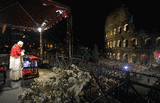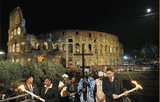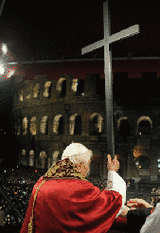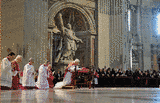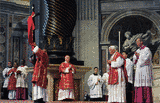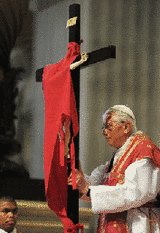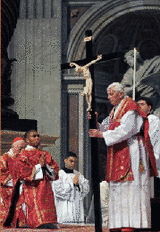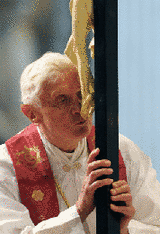Good Friday 2012
Via Crucis at the Colosseum
This year's meditations were by Danilo and Anna Maria Zanzucchi, from the Focolare Movement, Founders of the "New Families" Movement (which you can read in English, French, German, Italian, Polish, Portuguese & Spanish).
Papa Benedict XVI's Words after the Stations of the Cross on Palatine Hill
- in English, French, German, Italian, Polish, Portuguese & Spanish
"Dear Brothers and Sisters,
Once more in meditation, prayer and song, we have recalled Jesus’s journey along the way of the cross: a way that seemed a dead end and that instead changed the life and history of man, and opened the passage to “new heavens and the new earth” (cf Rev 21:1). Especially on this day, Good Friday, the Church celebrates, with intimate spiritual adhesion, the memory of the death of the Son of God on the cross, and in his cross she sees the tree of life, fruitful with a new hope.
The experience of suffering marks humanity, it marks the family too; how many times the journey is arduous and difficult! Misunderstandings, divisions, concern for the future of children, sickness, discomforts of various kinds. Then, in this our time, the situation of many families is aggravated by the precariousness of work and other negative effects of the economic crisis. The journey of the Via Crucis, which we have spiritually retraced this evening, is an invitation for us all, and especially for families, to contemplate Christ crucified in order to have the force to overcome difficulties. The cross of Jesus is the supreme sign of the love of God for every man, it is the superabundant response to the need that every person has to be loved. When we are in trials, when our families find themselves facing pain, facing hardship, let us look to the Cross of Christ: there we find the courage to continue on the journey; there we can repeat, with firm hope, the words of St Paul: “Who will separate us from the love of Christ? Will hardship, or distress, or persecution, or famine, or nakedness, or peril, or sword? … But in all these things we are more than conquerors thanks to him who has loved us” (Rom 8:35,37).
In afflictions and difficulties we are not alone; the family is not alone: Jesus is present with his love, he sustains the family with his grace and gives them the energy to go forward. And it is to this love of Christ that we must turn when human turmoil and difficulties threaten the unity of our life and our family. The mystery of Christ's passion, death and resurrection encourages us to journey on in hope: the stations of pain and of trials, when lived with Christ, with faith in Him, contain already the light of the resurrection, the new life of a risen world, the easter of every man who believes in his Word.
In this crucified Man, who is the Son of God, even death itself takes on new meaning and orientation, it is redeemed and overcome, it is the passage towards the new life: “Unless a grain of wheat falls into the earth and dies, it remains just a single grain; but if it dies, it produces much fruit” (Jn 12:24). Let us entrust ourselves to the Mother of Christ. She who accompanied her Son along his way of sorrows, she who stood beneath the Cross at the hour of his death, she who encouraged the Church at its birth because she lived in the presence of the Lord, may she lead our hearts, the hearts of all families through the vast mysterium passionis towards the mysterium paschale, towards that light which bursts forth from the Resurrection of Christ and shows the definitive victory of love, of joy, of life, over evil, suffering and death. Amen."
BXVI - Address, Friday, 6th April 2012 - © Copyright 2012 - Libreria Editrice Vaticana
Father Raniero Cantalamessa's Homily at the Celebration of the Passion of the Lord
St Peter's Basilica - in English, French, Italian, Portuguese & Spanish
"Some ancient Fathers of the Church enclosed in an image the whole mystery of the redemption. Imagine, they said, that an epic fight took place in the stadium. A courageous man confronted a cruel tyrant who had the city enslaved and, with enormous effort and suffering, defeated him. You were on the terraces; you did not fight, or make an effort or get wounded. However, if you admire the courageous man, if you rejoice with him over his victory, if you intertwine crowns, arouse and stir the assembly for him, if you kneel joyfully before the triumphant one, kiss his head and shake his right hand; in a word, if you rave so much as to consider his victory yours, I tell you that you will certainly have part of the victor’s prize.
However, there is more: imagine that the victor had himself no need of the prize he had won, but wished more than anything to see his supporter honoured and considers as the prize of his combat the crowning of his friend, in that case, perhaps, will that man not obtain the crown also though he has not toiled or been wounded? For sure he will obtain it!
It happens thus, say the Fathers, between Christ and us. On the cross, he defeated the ancient enemy. “Our swords — exclaims St John Chrysostom — were not bloodied, we were not in agony, we were not wounded, we did not even see the battle and yet we obtain the victory. His was the fight, ours the crown. And because we are also the conquerors, let us imitate what soldiers do in such cases: with joyful voices let us exalt the victory, let us intone hymns of praise to the Lord”! It is not possible to explain better the meaning of the liturgy we are celebrating.
But is that which we are doing itself an image, a representation of a reality of the past, or is it the reality itself? It is both things! “We — said St Augustine to the people — know and believe with very certain faith that Christ died only once for us … You know perfectly that all that happened only once, and yet the solemnity renews it periodically … Historical truth and liturgical solemnity are not opposed to one another, as if the second is fallacious and the first alone corresponds to the truth. In fact, of what history says occurred only once in reality, the solemnity repeatedly renews the celebration in the hearts of the faithful.”
The liturgy “renews” the event: how many discussions have taken place for the past five centuries on the meaning of this word, especially when it is applied to the sacrifice of the cross and to the Mass! Paul VI used a verb that could smooth the way to an ecumenical agreement on such an argument: the verb “to represent”, understood in the strong sense of re-presenting, namely to render what happened again present and operative (cf Paul VI, Mysterium Fidei).
There is a substantial difference between our liturgical representation of Christ’s death and that, for example, of the death of Julius Caesar in a Shakespeare tragedy. No one celebrates as a living person the anniversary of his own death; Christ does because he is risen. Only he can say, as he does in Revelation: “I died, and behold I am alive evermore” (Rev 1:18). We must be careful on this day, visiting the so-called sepulchers or taking part in processions of the dead Christ, not to merit the reproach that the Risen One addressed to the pious women on Easter morning: “Why do you seek the one who is living among the dead?” (Lk 24:5).
The affirmation of certain Orthodox authors is bold but true. The anamnesis, namely the liturgical memorial, “renders the event truer than when it happened historically the first time.” In other words, it is more true and real for us who relive it “according to the Spirit”, than it was for those who lived it “according to the flesh”, before the Holy Spirit revealed the full meaning to the Church.
We are not only celebrating an anniversary but a mystery. Again, it is St Augustine who explains the difference between the two things. In the celebration “by way of anniversary”, nothing else is required — he says — than to “indicate with a religious solemnity the day of the year in which the recollection of the event itself takes place”; in the celebration by way of mystery (“in sacrament”), “not only is an event commemorated but it is also done in a way in which its meaning is understood and it is received devoutly.”
This changes everything. It is not just a question of attending a representation, but of “accepting” the significance, of passing from spectators to actors. It is up to us therefore to choose which part we want to play in the drama, who we wish to be: Peter, Judas, Pilate, the crowd, the Cyrenean, John, Mary.... No one can remain neutral; not take a position, means to take a very precise one: that of Pilate who washes his hands or of the crowd “standing by, watching” (Lk 23:35).
If when going home this evening, someone asks us “Where are you coming from? Where have you been?” We must also answer, at least in our heart: “on Calvary!”
But all this does not happen automatically, just because we have taken part in this liturgy. It is a question of “accepting” the meaning of the mystery. This happens with faith. There is no music where there is no ear to hear it, no matter how loud the orchestra sounds; there is no grace where there is no faith to receive it.
In an Easter homily of the fourth century, the bishop pronounced these extraordinarily modern, and one could say existentialist, words: “For every man, the beginning of life is when Christ was immolated for him. However, Christ is immolated for him at the moment he recognizes the grace and becomes conscious of the life procured for him by that immolation.”.
This has happened sacramentally in Baptism, but must happen knowingly always anew in life. We must, before dying, have the courage to make a stroke of audacity, almost a sleight of hand: to appropriate to ourselves the victory of Christ. The unowed appropriation! A common thing unfortunately in the society in which we live, but with Jesus it is not only not forbidden, but it is highly recommended. "Unowed" here means that it is not due to us, that we have not merited it, but we are given it gratuitously, freely, by faith.
But let us be on the safe side; let us listen to a doctor of the Church. “What I cannot obtain by myself — writes St Bernard —, I appropriate (literally, I usurp!) with confidence from the pierced side of the Lord, because he is full of mercy. Hence my merit is the mercy of God. I am certainly not poor in merits, as long as he is rich in mercy. If the mercies of the Lord are many (Ps 119:156), I will also abound in merits. And what about my own righteousness? O Lord, I will remember only your righteousness. In fact, it is also mine, because you are righteousness for me on behalf of God” (cf 1 Cor 1:30).
Did this way of conceiving holiness make St Bernard, perhaps, less zealous in good works, less committed to the acquisition of virtues? Did perhaps the Apostle Paul neglect to mortify his body and reduce it to slavery (cf 1 Cor 9:27), he who, before all and more than all, had made of this appropriation of Christ’s righteousness the purpose of his life and of his preaching (cf Phil 3:7-9)?.
In Rome, as unfortunately in every big city, there are so many homeless. A name exists for them in all languages: homeless, clochards, barboni: human persons who possess nothing other than the rags they're wearing and a few object they carry around in plastic bags. Imagine that one day this voice spreads: on Via Condotti (everyone knows what Via Condotti represents in Rome!) there is the owner of a fashion boutique who, for some unknown reason, whether out of interest or generosity, invites all the homeless of Termini rail way station to come to her shop; she invites them to take off their soiled rags, to have a good shower and then choose the garment they want among those displayed and take it away, like that, freely.
Everyone will say in their heart: “This is a fairy-tale, it never happens!” Very true, but what never happens among men is what can happen every day between men and God, because, before him, we are those homeless people! This is what happens in a good confession: you take off your dirty rags, your sins, receive the bath of mercy and rise “clothed in the garments of salvation, covered with the robe of righteousness” (Is 61:10)..
The tax collector of the parable went up into the temple to pray; he said simply but from the depth of his heart: “God, be merciful to me a sinner!”, and “he went down to his house justified” (Lk 18:14), reconciled, made new, innocent. The same could be said of us, if we have his same faith and repentance, when we go home after this liturgy.
Among the characters of the Passion with whom we can identify, I realize that I have neglected to name one who more than all the others awaits those who will follow his example: the good thief.
The good thief made a complete confession of sin; he says to his companion who insults Jesus: “Do you not fear God, since you are under the same sentence of condemnation? And we indeed justly, for we are receiving the due reward of our deeds; but this man has done nothing wrong” (Lk 23:40f.). Here the good thief shows himself an excellent theologian. Only God in fact, if he suffers, suffers absolutely as innocent; every other being who suffers should say: “I suffer justly”, because even if he is not responsible for the action imputed to him, he is never altogether without fault. Only the pain of innocent children is similar to God’s and because of this it is so mysterious and so sacred.
How many atrocious crimes in recent times have remained anonymous, how many unresolved cases exist! The good thief launches an appeal to those responsible: do like me, come out into the open, confess your fault; you also will experience the joy I had when I heard Jesus’ word: “Today you will be with me in Paradise!” (Lk 23:43). How many confessed offenders can confirm that it was also like this for them: that they passed from hell to heaven the day that they had the courage to repent and confess their fault. I have known some myself. The paradise promised is peace of conscience, the possibility of looking at oneself in the mirror or of looking at one’s children without having to despise oneself.
Do not carry your secret with you to the grave; it would procure for you a far more terrible condemnation than the human one. Our people are not merciless with one who has made a mistake but recognizes the evil done, sincerely, not just for some calculation. On the contrary! They are ready to be merciful and to accompany the repentant one on his journey of redemption (which in every case becomes shorter). “God forgives many things, for a good work”, says Lucia to the Unnamed in Manzoni’s novel The Betrothed; with greater truth we can say, he forgives many things by one act of repentance. He promised it solemnly: “Though your sins are like scarlet, they shall be as white as snow; though they are red like crimson, they shall become like wool” (Is 1:18).
Let us now take up and do what we heard at the beginning, it is our task this day: with joyful voices let us exalt the victory of the cross, intone hymns of praise to the Lord. “O Redemptor, sume carmen temet concinentium”: And you, O our Redeemer, receive the song we raise to you."
